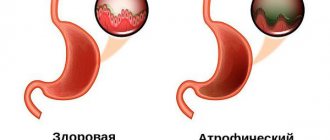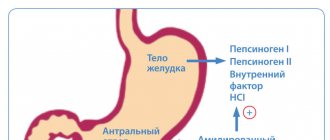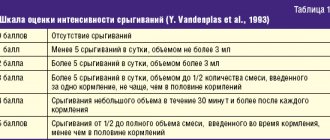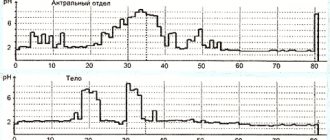Often people experience heaviness in the stomach, nausea, heartburn and other manifestations of inflammation of the mucous membrane - gastritis.
The reasons for its occurrence lie in dietary disorders, difficult-to-digest foods, errors in their preparation, irritation of the mucous membranes with medications, chemicals, and poisons. These factors lie on the surface: eat - get gastritis, but there are reasons that we absorb along with impressions of the world around us. The relationship between emotional shocks and the reaction of organs to them is described by psychosomatics. Let's consider the consequences of what life problems gastritis manifests itself from the perspective of psychosomatics.
Connection with childhood
During childhood, people develop feelings of satisfaction and satiety from eating food.
These feelings are associated with care, safety, love and remain into adulthood. The connection between the psychological state and the digestive process is so strong that any change in a person’s emotional background has a serious impact on the gastrointestinal tract. This phenomenon is studied and analyzed by psychosomatics.
For example, when there is danger or aggression, an involuntary spasm of the muscle cells of the stomach occurs. A person tries to eat food and drown out his fears, experiencing a feeling of security familiar from childhood. For this psychological reason, he loses control of himself and quickly absorbs much more food than he needs. Excess food enters the stomach, which is compressed due to stress and leads to the development of gastritis or ulcers.
Causes of gastritis
According to psychosomatics, gastritis manifests itself after any negativity due to internal and external reasons.
Modern medicine adheres to the following theory: with a psychological problem, the blow falls on the organs that are most vulnerable, thus creating a genetic predisposition to diseases. According to psychosomatics, the disease develops in parallel with the onset of any psychological situation that causes trauma to a person.
The main psychological causes of gastritis are:
- Lack of self-confidence and long-term negative emotions.
- Uncertainty in life. Lack of life guidelines for the future, constant internal feeling of fear and moral depression.
- Doom. If a person cannot change the development of bad events in life, this leads to his oppression.
The occurrence of gastritis indicates an unresolved conflict. If a person does not recognize problems at the psycho-emotional level, then the problem manifests itself at the physical level - the stomach.
When a person cannot change the nature of feelings, taking them under control, he begins to do this at the somatic level, and as a result, increased aggressiveness of gastric juice occurs.
Different types of gastritis have their own age and gender. Young men are susceptible to chronic gastritis with increased secretory function of the stomach. This is the result of increased aggressiveness and the inability to use it for “peaceful purposes.” Young men have high levels of sex hormones, in particular testosterone, which provokes aggression. At this time, young people need to express themselves in society and not be afraid to take responsibility for themselves and their actions. Emotional, social and psychological maturation slows down, which results in the slow development of gastritis.
Treatment of psychosomatic diseases
Treatment of gastritis is complicated by the fact that fear, internal need and uncertainty are replaced by gastrointestinal diseases, and the bodily syndrome remains visible. If the damaged organ or the symptoms of the disease can be cured with medication or surgery, then the side effect is mental symptoms - depression, drug addiction, fear. Psychosomatics tries to understand the language of organs as an expression of emotional phenomena and to separate them from factors of constitution and predisposition.
Relationships in psychosomatics that arise in patients are divided into two components: psychocentric and somatocentric.
In the first case, the clinical manifestations, the process of gastritis and the characteristics of the patient’s mental status are studied.
In the second case, nosogenic reactions are analyzed - the impact of the characteristics of clinical manifestations and the course of the disease on the patient’s subjective perception of his disease and the characteristics of mental disorders, the manifestation of which is associated with somatic suffering.
Exacerbation of gastritis: psychosomatics, mechanism
Psychosomatic gastritis does not appear immediately. The disease has a latent stage. During this period, the patient experiences a feeling of “sucking in the pit of the stomach” during negative emotions. This is observed before exams, performances and other important events. When a person calms down, all the discomfort in the stomach goes away.
During panic attacks, erosive gastritis may develop
Obvious signs of the disease appear only with strong emotional stress, resentment, conflicts, and outbursts of aggression. After an emotional shock, a patient experiences:
- heartburn;
- pain syndrome in the epigastrium;
- bloating;
- stool instability.
These manifestations can occur immediately after a stressful situation or 1-2 weeks after it.
Psychosomatic causes of stomach diseases
Psychology of diseases
Psychosomatics as a branch of psychology continues to develop, therefore there are different explanations for the causes of diseases. As a rule, they are similar to each other, but at the same time they have some differences. Let's look at the theories of the most famous and authoritative psychosomatists of our day.
Louise Hay's opinion
According to Louise Hay, the reason lies in negative thinking and a person’s lack of self-love. The psychologist advises dealing with the problem with the help of affirmations - positive attitudes for self-hypnosis, which need to be pronounced in the morning and evening. For each of the gastrointestinal diseases, Louise chose her own affirmation:
- Gastritis: “I love myself. I approve of myself. I'm always safe." The reason is a feeling of uncertainty and doom.
- Heartburn: “I breathe calmly, deeply. I'm safe. I trust life." The reason is strong fear.
- Ulcer: I love and approve of myself. There is peace in my soul. Everything goes well". The reason is fear and feelings of inferiority.
- General affirmation for stomach and intestinal diseases: “Life does not harm me. I learn something new at any moment of the day. Everything goes well".
According to Louise Hay, the main reason is the fear of the new, the fear of change. A person with such problems is not ready to make decisions, does not know how to make mistakes, and often suffers from perfectionism.
Zhikarentsev's opinion
According to Zhikarentsev, problems with the gastrointestinal tract are caused by a person’s inability to “digest” and accept something new. Apprehension, fear, worry, anxiety, inability to learn lessons and assimilate them also contribute. To stabilize the condition, a psychosomatist advises using such an af.
Opinion of Liz Burbo
According to Liz Burbo, disruptions in the gastrointestinal tract occur against the background of internal resistance. This is an indicator that a person cannot accept someone or something. Such a person adapts poorly to new conditions and is unable to accept new ideas or demands. Due to his rigidity and conformism, a person cannot even consider new ideas; he immediately denies them, perceives them as bad and dangerous. Any changes in life can unsettle such a person.
Opinion of V. Sinelnikov
According to V. Sinelnikov, stomach diseases indicate an inability to accept new life experiences, to see in difficulties and changes opportunities for personal growth and improvement of life. These are irritable, anxious and restless people who are afraid of everything new. They are wary of any information, not to mention new acquaintances, assignments, etc.
Opinion of O. Torsunov
According to Oleg Torsunov, stomach diseases are caused by laziness, irritability, apathy and cruelty. Laziness inhibits the functioning of organs, suppressed irritation causes inflammation, apathy leads to fading of organ activity, muscle atrophy, and low acidity. Cruelty and selfish motives provoke inflammation and lead to gastritis.
Why is it so important to be alone with yourself?
Psychology of illnesses: belching
Summarizing all of the above, we can highlight a list of psychological factors that cause stomach disease:
- suppressed emotions;
- fear of change;
- inability to express negative emotions;
- aggression, irritability;
- fear, stress;
- anger, anger, resentment;
- shame, feelings of inferiority, despondency;
- self-examination, self-criticism;
- perfectionism.
The psychosomatics of a duodenal ulcer or gastritis is caused mainly by negative, suppressed feelings. Starting work to get rid of a psychosomatic stomach disease can sometimes be difficult: you need to look inside yourself, admit something to yourself, and pull out old grievances.
https://www.youtube.com/watch?v=wbdW_IbDPUs
There are 2 ways to combat the psychosomatics of gastritis or gastric ulcer: with the help of a psychologist or on your own. Everything is clear with the first method, but let’s talk about the second in more detail.
The table of diseases compiled by Louise Hay has long been popular. People find and use it on their own, some are told about it by friends, others are told by doctors.
So, what does Louise Hay say about stomach diseases from a psychosomatic point of view:
- Stomach diseases are caused by fear, horror, inability to learn new things, fear of change. Af.
- Gastritis - caused by a feeling of uncertainty, doom. Af.
- Heartburn is caused by deep fear. Af.
- According to psychosomatics, a stomach ulcer is caused by fear, a feeling of inferiority and inferiority. Af.
As you can see, the key psychological cause of gastritis here is fear. Fear of change and change, inability to act decisively, perfectionism.
Louise Hay states: as soon as you start saying affirmations every day and believe in them, your life will begin to change for the better. With these positive attitudes, you will attract goodness and joy into your life, thereby giving warmth and care to your body.
Gastritis and ulcers are very insidious ailments. If they are caused by psychological reasons, then it becomes simply impossible to cure them without working on yourself. Psychosomatic diseases of the stomach require deep immersion into oneself, discovery of hidden emotions and their release.
The fight against the psychosomatics of gastritis is similar to the principle of operation of the stomach itself: for example, if you have eaten a low-quality product, your body (the stomach, in particular) immediately lets you know about it. He doesn't know how to speak, so he only gives pain signals. It’s the same with emotions: if they are of poor quality, negative, and there are a lot of them, your body is also trying to communicate this. The main thing here is to hear and correctly interpret these signals.
When should you seek help from a psychologist?
The help of a psychologist or psychotherapist is required when traditional treatment for gastritis does not help the patient. Other indications for consultation with a psychologist:
- The symptoms of the disease are not associated with malnutrition or poisoning . Signs of the disease are often caused by stress or negative emotions.
- A person has had depression and sleep disturbances for a month, which are accompanied by pain, abdominal discomfort, and dyspepsia..
- Signs of gastritis appeared against the background of severe nervous shock and prolonged depression.
In these conditions, gastritis therapy is carried out jointly with a psychotherapist. The patient is prescribed conversations, trainings, and psychological relief.
Childhood diseases
Reflux gastritis symptoms and treatment and diet superficial gastritis
Gastritis and gastroduodenitis in children often develop if adults give the child too much information that, due to his age (and stomach volume), he is simply unable to digest - for example, a child at the age of 4 attends two language courses, a music school and two sports sections. Tell me, will you be able to handle working, studying full-time at two universities and reading half a volume of the Great Soviet Encyclopedia every day at the age of 25-30? Even if you master it, you definitely won’t be able to digest the information and assimilate it. This is what happens to the baby.
According to psychosomatics, gastritis most often affects children who emotionally cannot “digest” a specific person in their environment. If in a group in a kindergarten someone constantly provokes conflicts, if a teacher or teacher causes rejection, if there is no warm relationship with a stepfather or stepmother, and this is accompanied by internal tension and irritation, then one should not be surprised by such a diagnosis.
It is important to approach treatment correctly and comprehensively. The child most often requires the help of a qualified child psychologist
Although people have been talking about the influence of negative emotions on a person’s physical condition since the time of Aristotle, our society still associates turning to a psychotherapist as something shameful. Compatriots should learn from the citizens of Europe, where a personal psychologist is a fairly common phenomenon.
As James Allen said, “No one can cure the ills of the body better than a cheerful thought; goodwill is an incomparable comforter, dispelling all traces of grief and sadness.”
Treatment of psychosomatic diseases
Doctors are just beginning to understand how mental pain, distress or trauma can cause severe physical symptoms in some people. A key aspect that contributes to the understanding of psychosomatic illnesses is that mental health cannot be considered separately from physical health.
Now, precisely because of the lack of a clear understanding of the relationship between the psyche and somatics, such diseases are difficult to diagnose and quite difficult to treat. For many psychosomatic patients, diagnosis takes years. The psychosomatic patient does not ask himself the question of the causes of his physical suffering. He interprets the symptoms of the disease exclusively as physiological pathologies that have no relationship with psychological aspects. This is why psychosomatic patients move from one treatment to another without finding the right solution. And when the source of the problem is finally revealed, patients find it difficult to believe it.
The truth is that psychosomatic conditions can be unraveled and physical symptoms reduced only by resolving the psychological problems behind them. Cognitive behavioral therapy is often the optimal choice in cases of gastrointestinal diseases caused by psychogenic factors.
The duration of treatment for psychosomatic diseases can vary from several months to one year. Psychotherapy aims to allow patients to understand and acknowledge their feelings, what makes them feel positive, anxious or depressed. Working with a therapist helps them cope with difficult situations in a more adaptive way. Psychotherapy can provide solutions to a range of problems, from depression and low self-esteem to addiction and family disputes. Anyone who feels overwhelmed by their problems and unable to cope can benefit from psychotherapy. The result of psychotherapeutic influence is strong mental and physical health, healing from psychosomatic gastrointestinal diseases. To treat a psychosomatic illness, you can contact the community of psychologists and rehabilitation specialists Irakli Pozharisky.
Treatment of psychosomatic gastritis
Louise Hay convincingly proves that the disease is caused by mental disorders, and psycho-emotional factors are decisive
When developing a treatment regimen for any psychosomatic illness, it is important to understand that it develops as a result of the inability to normally express one’s own negative feelings, regulate emotions, and the presence of a low threshold of emotional response. These circumstances cause inadequate brain signals that accumulate in mucosal receptors
A state of psychological safety and emotional relaxation is achieved during proper sleep, eliminating the causes of psychological overload, and eliminating symptoms of gastric discomfort.
Treatment of psychosomatic gastritis is based on the following principles:
Elimination of objective causes of abnormal mental state, if any
It is important to improve relationships in the family and in the immediate environment, and to smooth out problems at work. If it is not possible to normalize relations, then steps will have to be taken to change conditions (change of place of residence or work, divorce or marriage, birth of a child, etc.). Lifestyle optimization
It is necessary to ensure a combination of active, physical activities and proper rest. A vacation at sea, in the mountains, or in nature wouldn’t hurt. Frequent walks in the fresh air and sports help. The most important condition is to ensure normal sleep. Help from a psychotherapist. Through appropriate psychological treatment, the doctor ensures an increase in the threshold of emotional response, elimination of unreasonable negative emotions and mental disorders. His task becomes the correct manifestation of negative reactions without excessive overload of the nervous system. Independent psychological training, self-persuasion.
It is important to raise the patient’s level of self-esteem. In advanced forms of mental disorders, drug therapy is carried out when the disorders are suppressed with the help of special drugs
Louise Hay bases her treatment on the principles of self-hypnosis
Most experts believe that you can fight the psychosomatics of gastritis on your own. This is how Louise Hay bases her treatment on the principles of self-hypnosis. The patient convinces himself of his own worth by saying certain phrases out loud, and he must be convinced of the effectiveness of the technique. Self-hypnosis is based on the following phrases:
- I am absolutely calm and can always be myself.
- Life is beautiful and filled with joy, and thoughts are directed in the right direction.
- I leave all the bad things in the past and forgive my offenders.
- I love life in any manifestation and am confident that joyful events will appear.
- Everyone deserves a good attitude, fate will reward you.
- Thoughts and actions are correct and noble.
These phrases can be slightly altered for ease of pronunciation, but it is important to preserve their meaning. They must be said at least 2 times a day - in the morning after waking up and before going to bed.
We must believe that psychological problems can be overcome. If you are not so sure, you should consult a psychologist.
They must be said at least 2 times a day - in the morning after waking up and before going to bed. We must believe that psychological problems can be overcome. If you lack such confidence, you should consult a psychologist.
Despite the controversy surrounding the psychosomatic etiology of gastritis, psychological treatment has proven its effectiveness. Numerous positive reviews indicate the effectiveness of this method of treatment.
Treatment
A gastroenterologist deals with stomach problems. To make a diagnosis, you need to collect the patient's medical history (complaints) and confirm it with gastroscopy . This diagnostic method, using an optical probe, will help to visually examine the gastric mucosa and take the material for analysis.
Based on the type of gastritis, treatment with medications is prescribed. Nerves and gastritis, their relationship can only be destroyed with sedatives . This is the only method known to medicine. The duration of action of these drugs will help stop inflammation of the stomach only for a certain period of time, then the situation will repeat itself and the mechanism of stomach destruction will start again.
Having learned and understood the psychosomatics of gastritis, you do not need to look for a well-known doctor, buy expensive medications, or allocate time for hospitalization. You need to competently digest all incoming information, as if in parts, in small portions, chewing thoroughly, and consume a poorly digestible product.
Based on the interpretation of psychosomatic gastritis by Louise Hay, you need to accept your situation as absolutely safe. See its protective sides, rely on small nuances that bring joy and deliver positive emotions.
Conclusion
Eliminating the psychosomatic causes of gastritis is not an easy task, but everyone can solve it. The result will be worth the effort spent on achieving it. There are no special people who can do this and others cannot. There are obstacles that sometimes seem insurmountable.
Books on psychosomatics and specialist psychologists are always ready to help in solving, finding old problems that have been pushed into the depths of consciousness. All psychologists view diseases from the perspective of psychosomatic causes.
Why is it so important to be alone with yourself?
Gastritis and ulcers are very insidious ailments. If they are caused by psychological reasons, then it becomes simply impossible to cure them without working on yourself. Psychosomatic diseases of the stomach require deep immersion into oneself, discovery of hidden emotions and their release.
The fight against the psychosomatics of gastritis is similar to the principle of operation of the stomach itself: for example, if you have eaten a low-quality product, your body (the stomach, in particular) immediately lets you know about it. He doesn't know how to speak, so he only gives pain signals. It’s the same with emotions: if they are of poor quality, negative, and there are a lot of them, your body is also trying to communicate this. The main thing here is to hear and correctly interpret these signals.
Learn to watch not only what you eat, but also what you hear, feel and say. The quality and freshness of your emotions are no less important than the quality of food!
Psychosomatics: stomach
When the stomach hurts, it is psychosomatics that most often becomes the cause of trouble. The term implies an inextricable connection between the emotional and organ principles of a person.
Psychosomatics explains any indigestion due to the overly strong influence of negative emotions. Therefore, it is necessary to carefully monitor everything that the brain perceives and consciously limit any negative information.
Most often they affect silent and uncommunicative people who prefer to experience everything within themselves. They are the ones most often affected by various psychosomatic diseases. As already mentioned, the stomach is one of the most noticeable places in them. The more people chew unpleasant information, the greater its impact on the digestive system.
If emotions are also not expressed and rejected, the gastrointestinal tract, starting with the esophagus, is subject to severe influences. The human body is screaming for help, and if the individual does not provide it to himself, then pathology may develop.
How to cure gastritis caused by psychosomatics
Louise’s treatment methods are considered to be proven by personal experience; with their help, the author managed to overcome the terrible disease of humanity - cancer. Louise now has reason to share her experience with people.
According to Louise Hay, treatment consists in the fact that the patient needs to independently find the cause of his own illness, think about it and find a way out of the current situation. Then you will need to track the thoughts that provoked the disease. Thoughts will need to be taken for granted. According to Louise, thoughts do not arise by chance and become a signal for a solution, rather than a denial of the difficulty. “Love your illness,” says the author. Try to accept the disease and agree with the disease on ways to care for it.
Then you will need to compose affirmations, positive statements that open up the body’s internal reserves, helping to convince the subconscious that the psychological problem no longer exists and the path to full recovery is open.
When solving health issues, you need to love yourself with complexes and diseases. Then you are supposed to start affirmations, read them like a spell, for a long time. In this way, the brain receives information that the body is healthy and opens internal reserves for healing.
In order to prevent the onset of a disease, one must take care of one’s own inner world, love oneself, engage in self-development, and take care of morality.
Psychosomatic problems in children are quite possible; children, no less than adults, are susceptible to resentment, anger, envy and other negative emotions. Mental factors affect the state of the child’s nervous system and cause neurosis, asthma, and gastritis.
Curing diseases is possible with proper correction of the behavior of children and parents
It is recommended to pay special attention to adults, on whom children's health directly depends. Family quarrels, estrangement between spouses, divorces, the birth of younger children become driving factors leading to illness
If a child gets gastritis, parents need to notice both the quality of the child’s nutrition and state of mind. Perhaps the cause of gastritis was frequent stressful situations in the family, scandals of parents, misunderstandings between peers and teachers. Until the situations described are resolved, there is no talk of a complete cure for gastritis.
The article highlights a different path to recovery, a more constructive one. You need to love yourself, change your way of thinking and look differently at life's troubles. A positive attitude towards life will definitely relieve health difficulties and change your life for the better.
How does the psyche affect health?
Many emotions entail muscle tension, which can be so strong that it causes, as psychosomatics explains, pain in the stomach, because not only striated muscles react, but also smooth muscles.
The more a person tries to suppress his negative feelings, the more pronounced the body’s response is. Gastritis, peptic ulcers and even oncology are largely provoked by psychosomatic factors.
Scientists believe that the occurrence of diseases is explained by the desire of the stomach to digest not only food, but also any information coming from the outside. If it causes unpleasant emotions to a person, the organ immediately responds to them with special physiological reactions.
Diagnosis and treatment
If heartburn occurs, consultation with a gastroenterologist is necessary. The doctor collects anamnesis and prescribes the following examinations:
- clinical examinations of blood, urine and feces;
- gastroscopy;
- X-ray of the gastrointestinal tract;
- Ultrasound of the abdominal cavity.
If during the collection of anamnesis the presence of constant psychotraumatic factors is revealed, then an additional consultation with a psychologist or psychotherapist is prescribed.
To treat nervous heartburn, the same drugs are used as in classic cases. The difference is that in the first case the patient will have to work with a psychologist, since it is psychological problems that cause the disease. Until they are eliminated, treatment will be purely symptomatic.
The patient is prescribed the following recommendations:
Psychologist consultations. This is done to identify intrapersonal conflicts and help in the event of traumatic situations. All this will help reduce internal anxiety, which, in turn, will lead to a gradual normalization of the functioning of internal organs and systems. There may be situations when only this stage may be sufficient, and drug treatment will be short-term.
Normalization of the rhythm of life. Without fulfilling this point, treatment may not bring the expected results and become, in fact, symptomatic. The patient will need to reconsider his daily routine and give up some of his daily routine activities. As a last resort, change your occupation.
Dieting. This is done to maintain the functionality of a weakened stomach and reduce the load on the gastrointestinal tract. The eating regimen is important; it should be fractional and the portions should be small. You need to eat slowly, chewing your food thoroughly. All dishes must be warm; eating too hot or cold food is prohibited. You should avoid eating fast food, snacks, carbonated drinks, and processed foods. Smoked, fried, oiled and spicy foods will be prohibited. Preference should be given to baked or steamed dishes. Food should not be greasy, preferably liquid, without containing hard particles. For some time you will have to limit yourself to sweets and fresh baked goods, and review the list of vegetables and fruits you eat.
Drug treatment. The patient is prescribed several types of drugs. First of all, these are medications that will protect the mucous membrane during meals and reduce the amount of hydrochloric acid produced. They are taken before every meal. You may need to take enzymes during meals to help your weakened stomach digest food better and faster. It is possible to take analgesics and antispasmodics to eliminate painful symptoms. The use of antacids is indicated, which will help with sudden heartburn. An important point is the use of sedatives and sedatives, which are prescribed by the doctor strictly individually. In some cases, it is indicated to take decoctions and mixtures that will have a gentle effect on the inflamed mucous membrane or have a sedative effect.
With comprehensive adherence to the above recommendations, the disease responds well to treatment and does not reappear after some time.









